
Financial advisers love this time of year. It's an opportunity to look ahead and help clients plan their 2024, but also a moment to reflect on what worked (and what didn't) in 2023.
Regardless of income or background, it's fair to say 2023 was pretty tricky for many. It was a year of more expensive mortgages, squeezed budgets, and disruption to livelihoods and infrastructure as interest rate rises bit, prices rose, and industrial and protest action shut down bits of life we readily rely on.
Despite the gloom, there is plenty to get on top of, and it never hurts in the long run to sort your money out. I spoke with certified financial planner Steve Bridge and senior wealth adviser Alim Dhanji. Here are their top four ways to improve financial wellness this year.
Budget Strategically
"Adjust your budget to accommodate increased living costs. And prioritise essentials and identify areas where expenses can be trimmed; this can help maintain financial stability during economic fluctuations," says Dhanji.
Bridge refers to this as "clarity". He says few people know exactly where all their money is going, while only about 3-5% of people truly know. The big question is: is your money going where you want it to?
He says there are four categories when budgeting:
• Fixed monthly costs: mortgage, phone bill, wifi costs;
• Variable monthly costs: groceries, gas, restaurants, toiletries, pet food;
• Annual costs: property tax, Costco membership;
• Random costs: clothes, gifts, travel, car repairs, house repairs.
"Being clear about where the money is going puts the power of choice in your hands," adds Bridge.
Why do I Need an Emergency Fund?
Year in and year out people get caught up financially when they pay for emergencies.
Dhanji says an emergency fund should ideally cover six to 12 months of living expenses.
"The emergency fund acts as a financial buffer, providing a safety net during uncertain times and reducing the impact of sudden financial shocks," he says.
Stay on Top of Taxes
Bridge sees clients tripping over taxes frequently. He says to ask yourself: how can I minimise the amount of tax I pay?
"Tax planning is not a one-size-fits-all exercise," he says.
Thankfully, there are plenty of helpful explainers on tax allowances for investors who want to maximise the impact of their money.
You can do no worse than by reading our 2024 financial calendar, which details all the key dates and policy changes affecting investors this year.
Goals
"I was never a big goals person," says Bridge. Today, it's where he starts with clients.
A good place to begin is with short-, medium-, and long-term goal categories. Some common ones are earlier retirement, paying off debt and maxing out allowances; each can be placed within goal categories depending on a person's life stage.
Another popular topic right now is mortgages because of higher interest rates. Some mortgage-related considerations are lump sum payments, moving to accelerated payments, and the pros and cons of mortgage renewal. How do your goals align with paying down your home? Most importantly of all, is the plan realistic and sustainable over the course of the policy?
All the above are excellent talking points for your next meeting with a financial advisor to discuss this year’s budget. Because in the end what is a budget really?
"A budget is telling your money where to go, instead of wondering where it went," says Bridge. He adds that this is his new favourite quote.
This article was originally published on our Canada sister site and has been re-edited for UK audiences







:quality(80)/cloudfront-us-east-1.images.arcpublishing.com/morningstar/KWYKRGOPCBCE3PJQ5D4VRUVZNM.jpg)
:quality(80)/cloudfront-us-east-1.images.arcpublishing.com/morningstar/NYUEHSFI4BDCJPQZJ76HH4PKSM.jpg)




.png)








